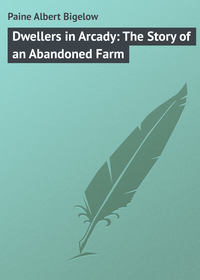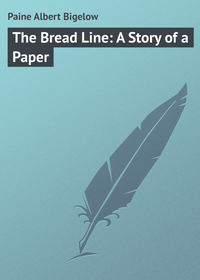 полная версия
полная версияHollow Tree Nights and Days
Mr. 'Possum moved over to the Edge of the World in the sun, hooked his tail about the same little bush, and went to sleep again. The other Deep Woods people looked at the way he did it, as if it was something new that they had never seen before.
Mr. 'Coon said: "I think I'd like a little, just a little, of that medicine; Mr. 'Possum's gift certainly would come handy at times."
Mr. Squirrel nodded.
Mr. Rabbit looked out over the Deep Nowhere, and said nothing at all.
A DEEP WOODS WAR
MR. 'COON TELLS A CURIOUS STORY OF LOVE AND BATTLEOnce upon a time Mr. Dog came over to the Hollow Tree to spend the evening with the 'Coon and 'Possum and the Old Black Crow, and pretty soon other Deep Woods people dropped in, and everybody was passing the time of day and feeling comfortable and happy in the good society of those present. They talked about the weather, and how it seemed to be a dry spring, and Mr. Rabbit said his garden was suffering, and Mr. Turtle said he had never seen the Wide Blue Water so low at this season for a hundred and nine or ten years. He couldn't remember just which it was, but it was the year that Father Storm Turtle, who lives up in the Big West Hills, and makes the thunder, was laid up with misery in his shoulder, and Mother Storm had to run the thunder-works, and tend to sick folks, too. Most people, Mr. Turtle said, believed that good, loud thunder helps to shake the rain out of the clouds, and very likely it was so, for the next spring, when Father Storm got well, he gave them enough of it, and it rained so that the Wide Blue Water came up into the Big Deep Woods as far as the Hollow Tree, which wasn't a Hollow Tree then, but a good, sound oak only about four hundred years old,—his Uncle Tom Turtle, who lived up by the Forks, having been just about that old himself when it came up as a sapling.5
When Mr. Turtle got through, none of the Hollow Tree people said anything at all, at first, for whenever Mr. Turtle mentioned how old he was, and the great ages of many of his family, it seemed to them too wonderful for words. But by and by Mr. Dog said that Mr. Turtle was very likely right about the thunder making the rain, for he had heard Mr. Man explain that the reason it was so dry this year was because there was a great war going on, on the other side of the world, with big guns roaring all day and night, and that the terrible jar and noise of those guns kept it raining there steadily, so there was no rain left for this side. Mr. Dog supposed that Father Storm Turtle could not get up a noise big enough to beat that war noise, and had about given up trying.
Then Mr. Rabbit asked why Mr. Man's people wanted to have war and fire those big guns at each other, which must be very dangerous and very apt to kill people, besides causing floods in one place and drought in another, which was bad for everybody concerned.
Mr. Dog said Mr. Man himself didn't know why all those Mr. Man's over there wanted to have a war. Mr. Dog had heard Mr. Man say that those people over there didn't know themselves what it was all about, and that they were killing each other every day by the thousand with those big guns, and losing all their property, for no reason at all that anybody could think of, except, perhaps, to take each other's country, which probably wouldn't be worth much now, whoever got it. Mr. Dog said that, of course, Mr. Man's people were very smart in many ways, but that as nearly as he could find out they had always been very silly about wars, and had fought many of them, for no good reason, instead of being wise like the Deep Woods people, who only fight to get something to eat, or sometimes when there are rivals at a time of courtship. Mr. Dog said his own people were more like Mr. Man's, probably from association, and that more than once at Great Corners he had been set upon by a perfectly strange Mr. Dog, without cause; but even then it was generally a single-handed affair and soon over, except once, when he believed every Mr. Dog in Great Corners took a hand for a few minutes, though nobody was hurt and everybody seemed to feel better for the exercise.
Mr. Dog went on to say that he seldom enjoyed these occasions, and lately had stayed in Mr. Man's car while they were at Great Corners and talked earnestly to any strange dog that came around looking for war.
Then Mr. 'Coon, who hadn't said a word so far, but had just been smoking and thinking, seemed to wake up out of deep reflection, and said:
"I know something about war. I thought of making one, once, and afterwards I saw one."
Then everybody looked at Mr. 'Coon, who is usually rather quiet, and asked him to please tell about those wars—nothing could be more interesting, just now, than to hear about them.
So Mr. 'Coon filled his pipe up fresh, and told them.
"Well," he said, "there isn't much to tell about the first one. I was quite young, and there was a family lived not far from us who had a young Miss 'Coon that I thought I would like to set up housekeeping with, and when I mentioned it she was a good deal in the notion, too. Everything seemed to be going along quite well until, one day, another young Mr. 'Coon came along and saw Violet—that was her name—and he had the same plan that I had. He belonged to that family over near the Jagged Bluffs—a common, oversized lot, with no style to speak of. I had never seen him, myself, when I first heard about his coming to call on her, and made up my mind I would fight him the first time we met. Then I thought I had better get a look at him and study his weak points, without him seeing me; so I hid in the bushes one afternoon, near Violet's house, to watch him pass. When, pretty soon, he came along and I saw the curious shape and size of him, I decided that Violet was not worthy of me. He was very wide forward, and his hind legs were set in a peculiar way. I can't imagine what Violet could see in him."
Mr. 'Coon sighed and took time to fill his pipe before he went on.
"That was the war I thought of making," he went on, after a minute or two, "and that was all there was of it. I took a walk over to see a good friend of mine, in those days, a young Mr. Bear named Redfield, generally called Cousin Redfield, or Reddie. Mr. Crow once told us about some of his little-boy adventures, as you may remember. Well, I found Cousin Redfield and told him what had happened, and he said he would go with me and help me fight that spread-shouldered ruffian, and asked me what were his weak points. I said I hadn't noticed any, and we decided that we wouldn't bother with him, and went to visit a honey-tree that Cousin Redfield had found and thought of robbing, some night. I said I didn't think it was right to rob the bees of their honey, but that we would go and look at it, to take my mind from less pleasant things.
"So we walked a good ways until we came to it, and it was there that I saw the other war that I mentioned. It seems there were several swarms of bees in that tree, it being quite a big one with a number of hollow limbs. Every year when the young bees had made new swarms they had moved into vacant limbs, until, I suppose, the tree had become quite full and pretty crowded. I don't know what had started the trouble, but there was a good deal of it going on when we got there. Perhaps some strong new or old swarm was trying to drive out a weak one and take its place. Anyway, there were about a million of those bees buzzing and whirling about outside, and you could smell that they were mad, and you could see that they were fighting, for there were dead ones on the ground, and they were pattering down on the leaves quite fast. Cousin Redfield and I first thought it was sprinkling, until we saw that the falling drops were dead bees.
"But that was nothing to what happened a few minutes later. For all those other swarms, one after another, pretty soon began to pour out from the different holes in the limbs and body of the tree, and join in the war, until the air around that tree was just black with fighting bees, and the dead ones were coming down so thick that I would not have cared to stand under it without Mr. Man's umbrella.
"Cousin Redfield and I got off a little ways to watch it. Cousin Redfield said that perhaps we ought to interfere, but I said that it wasn't our war, and that it would be better to wait and see what we could do when it was over.
"So we got in a good safe place and looked on, and I never thought anything could be like it. I don't know how those bees could decide which side they were on, or what they were fighting about, or which side was which. They must have been all relatives once, and would be all cousins, or something, now. They all looked exactly alike to Cousin Redfield and me, and pretty soon they got very thick on the ground, like a kind of black moss or something, that was spreading and piling up deeper every minute and doing nobody any good, and not deciding anything, that we could see. Cousin Redfield and I made up our minds that they had all gone crazy.
"I don't know how many millions of those bees there were, but they made a noise like Mr. Man's automobile when it is running at high speed, and that mad-bee smell was so strong that it seemed to Cousin Redfield and me almost dangerous to stay there. So we got a little farther away, for we didn't know but that all those bees might suddenly decide to quit fighting one another, and make a rush at us. But that didn't happen. They were too busy with their war. They kept on pouring out of the tree until there were no more left to come, and that black cloud whizzed and stung and smelled, and the black moss on the ground kept growing and spreading until we could see that the live ones were thinning out. By and by there were more bees on the ground than there were in the air, and we thought they would quit then and go to work, but they kept right on until they were more than shoe-top deep on the ground and just about ordinarily thick in the air, and still fighting.
"I don't know how long it was that Cousin Redfield and I stood there watching those bees kill one another, but I know by sunset there were not more than a dozen or two left, and they were roosting about on the limbs and leaves, worn out or crippled, and not able to fight any more.
"Then Cousin Redfield said he thought it was time for us to interfere and see what could be done, so we each broke off a little birch brush and swept a path through that black bee moss, and looked into the hole at the bottom of the tree, but couldn't hear anything. So we climbed up a little ways and pretty soon came to honey—bushels of it. There were no bees there except a few fat, lazy ones that couldn't sting, and were probably kings or queens or something, and we didn't mind them. We ate all the honey we could, and went home, and next morning got baskets and all day long carried honey out of the bee-tree and had enough to last our families for a whole year, the best honey I ever saw in the Big Deep Woods, and the most I ever expect to see.
"We didn't get it quite all, though, for the second morning when we came back we found the tree occupied. Violet and that big, rough creature from the Jagged Bluffs had found it, and started housekeeping there, with enough honey to last them at least a month. I heard later they called it their honeymoon, and I believe people sometimes call the first few weeks of being married by that name still.
"Cousin Redfield said he would help me drive them out, if I said so; but I said no, that place had seen war enough, and with all the honey we had at home I could get along without the present contents of the tree, so we went away. I said that something would probably happen to those two for the way they had done, and I was right. For about six weeks later the honey smell of that tree brought another big, new, strong swarm of bees to settle there, and they turned Violet and her thick-necked partner out, in about two minutes, and took full possession. Cousin Redfield Bear and I used to walk over that way every day, to observe things, and we happened along just as it was going on. That fellow's wide build didn't help him any against bees. Violet came out first, pawing her nose with one hand, and knocking bees with the other. He stayed to fight a little, but directly he rolled out, scratching and pawing, and five minutes later his own mother wouldn't have known him, he was so swelled. Violet looked at him, and then at me and Cousin Redfield laughing at him, and I think would have deserted him for me, then; but Violet herself had one eye closed, and her nose was the shape and size of a reversed turnip. I saw then that I had never truly loved her and had been wise to give her up. They left the country soon afterwards and I don't know what became of them. That honey-tree blew down one winter night about a year after, and then Cousin Redfield and I went back and got some more honey, but not as much as we did after the great war."
The Hollow Tree people hadn't said a word during Mr. 'Coon's story, but when he had finished Mr. Dog said so far as he could see there was just about as much sense in that war as there was in the one going on over on the other side of the world, and that the war over there would very likely end in about the same way.
But Mr. 'Possum said that Mr. 'Coon's war was a good deal better than Mr. Man's, because, being so soon over, nothing but those silly fighting bees was wasted; and for Mr. 'Coon and Cousin Redfield Bear to have stayed out of it until there was no more fighting, and then go in and carry off a wagon-load of honey, was probably the smartest thing they had ever done in their lives.
MR. CROW AND THE WHITEWASH
ITHE OLD BLACK CROW TRIES A STRANGE EXPERIMENTOne very nice May morning when Mr. Crow went over to call on Jack Rabbit, he found him whitewashing his back fence, and after Mr. Rabbit had showed Mr. Crow how fine it looked when it was dry, he took him into the kitchen, which he had whitewashed the day before, and Mr. Crow went on about it and said it was the nicest thing he ever saw, and if he just knew how, and had the things to do it with, he would whitewash his own kitchen in the Hollow Tree.
Then Mr. Jack Rabbit said it was the easiest thing in the world—that all one needed was a little quick-lime and some water and a brush, and then some practice in putting it on so it would look nice and even, and not spotty and streaky, as was so liable to be the case when one had not learned how. Mr. Rabbit said he had borrowed some quick-lime early one morning from Mr. Man's lime-kiln, over in the edge of the Big West Hills, and that Mr. Crow could get some at the same place if he went early enough and took a basket to bring it home in. Jack Rabbit said that you must put the lime into a barrel, or a tub, or something, and then pour water on it, which would make it hot and smoky, quite suddenly, which he supposed was the reason it was called quick-lime, but that by and by it would grow cool and turn white, when it was called "slack" lime, and then it only needed some more water to make the beautiful, clean whitewash which Mr. Crow admired so much. As for practice, he said, he would let Mr. Crow try a little on his back fence.
So then Mr. Crow and Jack Rabbit went back to the fence job, and Mr. Rabbit stirred the whitewash and dipped in the brush, and made a few strokes, right and left, and then crossed them up and down, and then right and left again, to get the material on nice and smooth, and stood off to look at it until it began to look white and clean, because the sun was hot and dried it very fast; and pretty soon he let Mr. Crow have the brush. Mr. Crow did very well for the first time, and kept improving right along, and Jack Rabbit sat in the shade, where it was cool, and let Mr. Crow go on practising and improving, until he had whitewashed almost all the fence, and felt so hot and warm he was about ready to drop, beside being dazzled from looking at the boards that got as white as snow, with the hot sun shining on them.
Then all at once Mr. Crow noticed something else. He had not been very careful about splashing the whitewash and had got some of it on different parts of himself, and especially on the wing that he worked with, and when he stopped and looked at it, he said, "Good gracious!" for wherever the whitewash had got on him he was not black any more, but snow white.
And right then Mr. Crow had an idea. He put the brush in the pail, and came over and stood in front of Jack Rabbit, and said:
"Why can't you whitewash me?" he said. "I've always thought it would be pleasant to be white, for a change. I heard of a white crow, once, in our family, and I always wondered how he got that way. Of course he must have been whitewashed—I can see it, now, as plain as anything. I am sure you could whitewash me, Mr. Rabbit, with all the practise you've had, so that none of the black would show. Whitewash me for Sunday, Mr. Rabbit, and I will go home and give Mr. 'Coon and Mr. 'Possum a great surprise."
Well, Mr. Rabbit was delighted. He dearly loved to try experiments, and prepare surprises, and to show how well he could do things. He said he believed he had heard of people being whitewashed for Sunday, and that Mr. Crow, who was so nice and smooth outside, would be just the one to be fixed up in that way. He said Mr. Crow might need more than one coat to make him seem perfect, but that he would take time and do a good job. Then he said he had a smaller brush in the house, for fine work, and would get it right away.
Mr. Crow was already in hot weather costume and only had to lay off his vest for Jack Rabbit to begin, and pretty soon Mr. Rabbit came back with the fine brush and went to work. He told Mr. Crow to shut his eyes and keep them shut until the stuff was dry, as it might smart a little if it ran in them, and to stand in the sun, which Mr. Crow did. Jack Rabbit began at the top and whitewashed clear down to his feet, and then told him to turn around slowly, so the sun could get on all sides of him, and get him dry enough for a second coat.
So Mr. Crow turned around and around, and kept his eyes shut, and got quite dizzy, before Mr. Rabbit told him he could open his eyes now and see how he liked his appearance as far as gone. And Mr. Crow looked and said he liked it very much, though he was pretty streaky in places. Mr. Rabbit said the next coat would surprise him, and told him to shut his eyes again, which Mr. Crow did, and Jack Rabbit gave him another and very heavy coat, from head to foot. Then when Mr. Crow had turned and turned in the sun to dry himself, he looked again and was quite pleased. He was almost entirely white, now, and Mr. Rabbit said one more coat would fix him.
So then Mr. Rabbit gave him the last coat and laid the whitewash on thicker than ever, especially in places, and when Mr. Crow could open his eyes he went in and looked at himself in Mr. Rabbit's long glass, and said he never thought anything so astonishing as that could happen to anybody, and declared he must hurry right off home now, and that he was going to make up a lot of whitewash and keep himself looking like that all the time, and his kitchen, too, and perhaps all the rest of the Hollow Tree, for there was certainly nothing in the world so wonderful as whitewash.
Then Mr. Crow thanked Mr. Rabbit and hurried off, but pretty soon walked slower, for, as he got dryer and dryer, the thick whitewash got stiffer and more caky, and Mr. Crow cracked a good deal as he walked, and he was afraid his nice new color might come off if he wasn't careful.
Mr. 'Possum and Mr. 'Coon were taking a nap in the sun when Mr. Crow got back to the Hollow Tree, and didn't hear him until he was standing right in front of them. Then they both woke up at once and took one look at the strange, white creature standing over them, almost blinding in the sun, and each one thought at first he was having a very wonderful dream, and couldn't speak for enjoying it. But when Mr. Crow started to come closer they were not so sure about the dream, and both gave a big jump and made for the down-stairs door of the Hollow Tree, and got inside and bolted it tight.
That, of course, made Mr. Crow laugh, but not loud enough for them to hear him, and pretty soon he went to the door and tried the latch, and then knocked, and Mr. 'Possum called out—
"W-wh-who's there?"
"Why, it's me!" said Mr. Crow. "What have you got the door bolted for?"
And Mr. 'Coon called out, "Oh, Mr. Crow, did you see anything out there?"
"Why, no," said Mr. Crow. "What made you think so."
And Mr. 'Possum said, "W-we saw something very strange out there, Mr. Crow—a v-very curious bird!"
"I guess you were dreaming," said Mr. Crow. "There is no bird out here but me, that I know of. Open the door so I can come in and get the dinner."
So then Mr. 'Possum and Mr. 'Coon pulled back the bolt and opened the door, but when they saw Mr. Crow standing there, so white and shining, Mr. 'Possum fainted and Mr. 'Coon got behind a barrel until they heard Mr. Crow laugh and ask them if his new complexion had changed him so they didn't know him?
Then Mr. 'Possum came to, and Mr. 'Coon came out, and Mr. Crow told them all about how it happened, and they all went out in the sun again, and Mr. 'Coon and Mr. 'Possum walked around Mr. Crow and admired him and talked about his great change, and Mr. 'Possum touched him and said his complexion seemed pretty solid, somewhat like a shell, and Mr. Crow told him how he had to move rather carefully in it, at first, though very likely it would limber up in time. Then he told them how he was going to do the kitchen that way, and perhaps other things, and they all got excited and talked about it, and Mr. 'Possum said that probably he would have them give him a coat next winter, to match the snow which would be handy, nights when he was borrowing chickens from Mr. Man, though he supposed he would have to be dipped. Then they went in to dinner, and Mr. Crow set out such things as did not require much exercise, and by and by they all talked about it a great deal more and decided to have a regular cleaning up and whitewashing, like Mr. Rabbit's. Mr. 'Coon said he and Mr. 'Possum would do the cleaning up if Mr. Crow would attend to the whitewashing, as he had learned how, and they would all begin next day.
IIWHAT CAME OF MR. CROW'S GREAT EXPERIMENTWell, Mr. Crow slept sitting up in a chair that night, for fear of damaging his new complexion, and next morning was out very early with a basket, on the way to Mr. Man's lime-kiln in the edge of the Big West Hills.
It had rained a little in the night, and Mr. Crow was rather afraid he might get his new complexion wet on the bushes, so he stepped very carefully and was not really comfortable, though proud of his looks. He was gone a good while, but Mr. 'Coon and Mr. 'Possum were still asleep when he got back, so he emptied his lime into an old barrel behind the stove where he intended to mix it by and by, and started the breakfast before calling them. They didn't get up right away, though, so Mr. Crow sat down and had a cup of coffee and a biscuit or two, and then called to them that he was going over to borrow Mr. Rabbit's whitewash brush. He might be a little while getting back, he said, but that they could start their job any time.
So then he left, and Mr. 'Coon and Mr. 'Possum had their breakfast, and talked about what they would do, and decided that Mr. 'Coon could set things to rights in the house, and Mr. 'Possum could rake the leaves. After that they had some more coffee and talked some more, and Mr. 'Possum stretched and said he hadn't slept very well, and didn't know as he cared so much about cleaning up things this morning as he had yesterday, but he supposed they must be getting at it, as Mr. Crow seemed to have his mind set on changing things in general since Mr. Rabbit had got him started in the direction of whitewash, which improved him, of course, in some ways; though it certainly made him less homelike and familiar and seemed to affect his cooking.
Then Mr. 'Possum yawned again and went down-stairs and got the rake, and went out and began to make a few little piles of leaves, which were quite wet from the rain, and did not rake very easy, and made him tired. So pretty soon he called up to Mr. 'Coon, who was sweeping and moving furniture, and asked him what he should do with the leaves, as they were too wet to burn, and if he left them there until they were dry the wind would blow them all about again.
Mr. 'Coon looked out the up-stairs window and told him he'd better fetch them up and put them in something in Mr. Crow's kitchen, so he could have them to light his fire with when they got dry. Then pretty soon he came down and helped Mr. 'Possum, and they carried them up, and saw Mr. Crow's barrel, and threw them in until it was quite full, then poked them down and put in some more, and said how glad Mr. Crow would be to have them, and that now they would go outside and rest a little, until they saw him coming.









